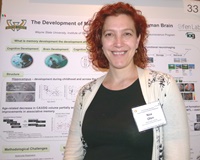National Academy of Sciences selects Dr. Noa Ofen as Kavli Frontiers Fellow

DETROIT — A Wayne State University faculty member presented her research on capturing episodic memory development at the 19th German-American Kavli Frontiers of Science Symposium, a prestigious biannual meeting held April 4-6 in Irvine, Calif.
Noa Ofen, Ph.D., an assistant professor in the School of Medicine's Department of Pediatrics and WSU's Institute of Gerontology, was among the 70 researchers competitively selected and invited to present as Kavli Frontiers Fellows, a scholarship co-sponsored by the Alexander von Humboldt Foundation and the National Academy of Sciences.
Attendees are selected by academy members from a pool of young researchers who have already made recognized contributions to science and have been identified as future leaders in science.
"The Frontiers of Science experience was incredible," Dr. Ofen said. "It is a great honor to be recognized as one of the top young scientists in my field. The opportunity to discuss major scientific issues across a broad range of disciplines with bright scientists who work in the frontiers of each discipline was extremely energizing. The symposium reminded me how exciting science exploration is, not only within my field, and motivated me to look more broadly at conducting impactful research."
The meeting allowed participants like Dr. Ofen to explore innovative research ideas across a wide variety of fields and develop new networks that will serve them as they progress in their careers.
"This meeting took me back to my high school days, when I was selected to represent Israel -- where I then lived -- at the International Youth Science Meeting in the United Kingdom. It was wonderful experience then and a good reminder now of how fascinating science is," she added. "It was a great opportunity to represent Wayne State University and our strength as a research university."
She presented "Development of Memory Systems in the Human Brain" in a poster as part of the meeting's formal session on neuroplasticity and development.
"Episodic memory - the ability to encode, maintain and retrieve information - is critical for everyday functioning at all ages, yet little is known about the development of episodic memory systems and their brain substrates," Dr. Ofen said. "The use of neuroimaging methodologies, including MRI, in the study of episodic memory development is providing new insights into the neural underpinnings that support improvements in episodic memory."
She presented data on these neural mechanisms, highlighting evidence that demonstrates how functional and structural brain development underlies changes in memory functioning throughout childhood and adolescence. She leads the Ofen Lab for Cognitive and Brain Development, which investigates structural and functional brain development across a wide age range of typically developing children and adults. Using tests of cognitive abilities combined with neuroimaging techniques, she probes how brain structure and function shape human cognitive functioning across development. She has worked to explore the structure and function with a neurodevelopmental basis of the hippocampus, a crucial brain structure for learning and memory that is altered in a number of psychiatric disorders.